The 2020 SEO Roadmap for Small Businesses
Contents
Guide to Small Business SEO in 2020
- Prioritize On-Page SEO
- Don’t Lose Sight of the Importance of Local SEO
- Leverage Long-Tail Keywords to Increase Quality Traffic
- Link Building for the Win
- Make Your Website Mobile-Friendly
- Turn to the Pros for a Winning 2020 SEO Strategy!
If your search history is replete with entries like “how to do SEO for small businesses in 2020” and “SEO strategy for small businesses,” you’re on the right track.
According to research, over 36% of small businesses in the U.S. have a strong SEO strategy in place. And it should come as no surprise that this bracket also enjoys enviable business growth, high-quality traffic, impressive visitor-to-lead conversion rates, and high rankings on SERPs.
As digitalization becomes the new norm, relying on traditional (offline) marketing strategies simply isn’t a feasible option for small businesses anymore. While resorting to word-of-mouth and handing out business cards may have worked in the past, it’s an inefficient, minimally effective, and impractical way to market a small business in 2020.
In comparison, leveraging SEO is a powerful way to build and sustain a strong online presence and take your company to new heights.
According to a recent study, there are over 3.5 billion Google searches a day. Moreover, the U.S. is expected to hit 300 million online shoppers by 2023; that’s over 91% of the population!
And while easing your business into the digital landscape is a great way to get started, it’s not enough. With the competition rising each day, standing out from the crowd is imperative.
Simply building an online presence won’t cut it; you have to go the extra mile and ensure your business dominates search engines and attracts quality traffic.
This is where SEO steps in!
We’ve rounded up some of the most innovative, effective, and whip-smart SEO practices for small businesses to help you establish and maintain a winning online presence in 2020.
If you’ve been keeping up with our blog, you may have interacted with our earlier blog titled “The 2019 SEO Roadmap for Small Businesses.” We suggest giving it a quick read so you can brush up on the basics and identify changes that have occurred since. Be on the lookout for practices that are just as effective today so you can continue to implement them in your SEO strategy.
Let’s get started!
Guide to Small Business SEO in 2020
1. Prioritize On-Page SEO

A whopping 75% of internet users never scroll past the first page of Google. So while you may have created engaging content, forgoing optimization could easily take you back to square one.
The first step to leveraging SEO is prioritizing on-page optimization.
Simply put, on-page SEO is the practice of optimizing web content, product/service pages, and additional pages to earn higher rankings on SERPs.
An added benefit? You’ll manage to attract quality traffic instead of desultory digital window shoppers.
Kick the process off by compiling a list of essential on-page SEO factors you should prioritize.
We suggest focusing on:
- Title tags
- Meta descriptions
- Header tags
- Content headlines (H1 tags, H2 tags)
- Alt text and descriptive titles for image optimization
- URL optimization
Optimize each component of your web page by using relevant keywords that not only increase visibility and help you climb SERPs, but also improve click-through rates.
Using the right tags will also lend legitimacy and authority to your content. This will lead to Google perceiving your website as a reputable source.
The outcome? Improved rankings and greater chances of earning high-quality backlinks!
Using relevant and concise title tags and meta descriptions is a great way to boost organic rankings. As visitors are informed about the content enclosed within each web page, they’re more likely to find the information they’re looking for, and are more likely to click-through as a result.
We also suggest writing compelling (and optimized) headlines to entice users to engage with your content. This subtle yet powerful optimization tactic is popularly used to turn an impression into a click.
While image optimization is usually overlooked by most small businesses, it’s a powerful weapon in the SEO arsenal. From improving page load times to enhancing user experience, image optimization plays a central role in ensuring your audience sticks around. Use alt text and descriptive titles to boost your website’s SEO ranking, while also making it more accessible to people with special needs.
We also recommend making the most of URL optimization by keeping URL lengths short, using lowercase letters, ensuring readability, and using hyphens instead of underscores. Of course, don’t forget to include relevant keywords.
According to research, short URLs have a ranking advantage over long URLs.
While these changes may seem overlookable at first glance, they can heavily impact the visibility and rankings of your website.
2. Don’t Lose Sight of the Importance of Local SEO

Optimizing your website for local search results is the oldest SEO trick in the book, and it’s managed to stand the test of time.
How?
Because it works well. Especially for small businesses that have local outreach!
While targeting a wide global audience may sound tempting, it can prove to be counterproductive.
Instead, prioritize local SEO to attract customers who are actually interested in and capable of investing in your products/services.
This is a great way to improve the visitor-to-lead conversion rate.
According to a recent study, over 72% of consumers who performed a local search ended up visiting the store if it was within five miles. In fact, searches that include the keywords “near me” or “close to me” have increased by an astounding 900% over the past two years.
If users search for “Mexican restaurants near me in Los Angeles,” they’ll be presented with the following Google 3-Pack:
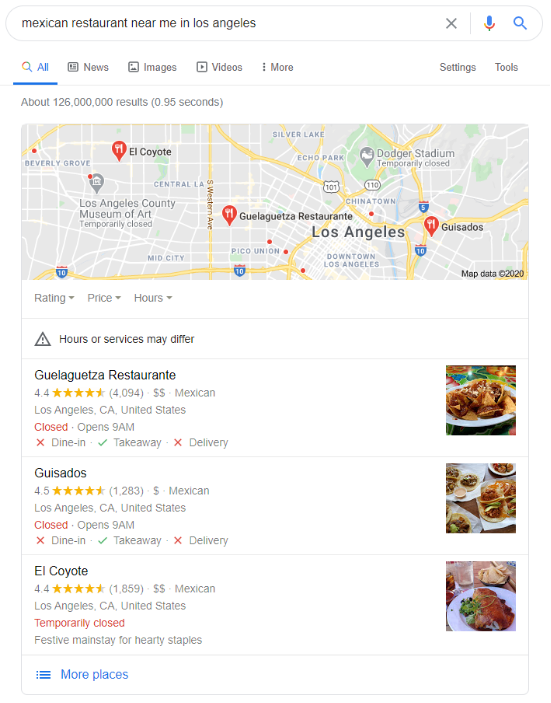
Of course, the large majority of users only engage with the top three search results that are enclosed within the Google 3-Pack.
But how do you increase your chances of ensuring that your business appears in the Google 3-Pack?
Here’s how.
Leveraging Google My Business is a leading local SEO tactic that helps small businesses climb SERPs and increase quality traffic.
Click here to claim your free Google My Business listing.
We suggest taking the time to assiduously fill out all the requested information.
This generally includes your company’s:
- Name
- Address
- Phone number
- Business hours
- Website
- Category
- Description
- Photos
- Reviews
The information you enter will appear in Google’s search results. We suggest ensuring accuracy and relevancy to climb SERPs and earn a spot on the Google 3-Pack.
In addition, update your listing by sharing visually compelling and high-resolution images and videos of your business. Ideally, you should upload a square-sized logo image and attractive cover photo.
Of course, don’t stop there!

Optimize your listing by ensuring NAP (name, address, and phone number) consistency, actively requesting and responding to reviews, engaging with your audience using Google My Business Messages, and tracking customer paths using Google My Business Insights.
We also suggest contacting SEO experts to help avoid penalty-inducing offenses. Using white hat SEO strategies will help you boost business without risking suspension.
Estela’s comprehensive listing is a powerful example of how to start off on the right foot!
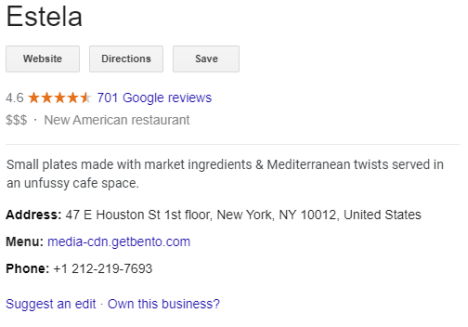
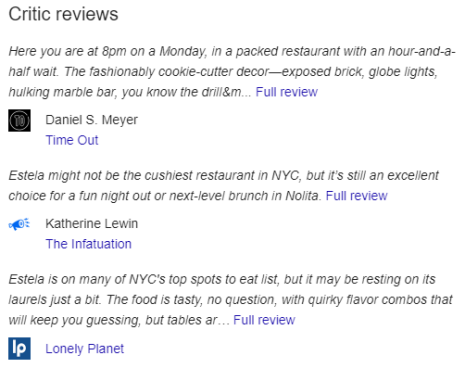
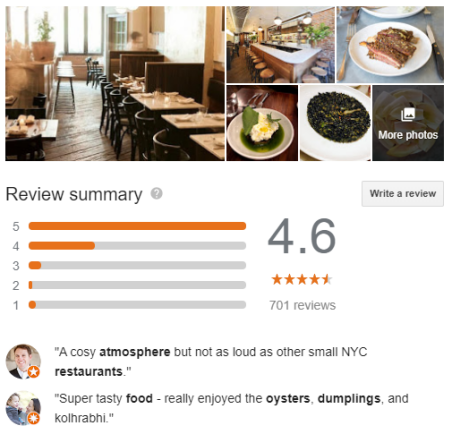
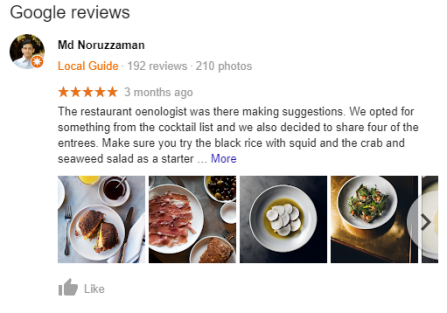
We also recommend improving local SEO by creating content based on local activities, events, and stories. Using region-specific keywords will help you attract and build a local audience.
Use Google’s Keyword Planner to search for popular keywords and incorporate them into your content accordingly.
While leveraging Google My Business is essential, making the most of online business directories is equally important! Boost local SEO by sharing your company’s NAP (name, address, and phone number) and an engaging description.
We suggest opting for popular online business directories like Yelp, Yellow Pages, Foursquare, and MapQuest, among others.
3. Leverage Long-Tail Keywords to Increase Quality Traffic

While using specific keywords was the way to go in 2019, 2020 has been all about long-tail keywords.
According to research, long-tail keywords convert 2.5 times higher than head keywords. In fact, long-tail keywords now account for over 70% of all web searches!
Astonishing, right?
So if your keyword strategy has been solely focused on leveraging short-tail keywords, you may want to make some major adjustments.
Ideally, long-tail keywords include three or more words. Their efficacy has to do with their descriptive nature. While users were previously more interested in running concise queries, there has been a recent shift toward more detailed—albeit precise—queries.
While the length is slightly longer to direct more relevant search results, the searches are still relatively succinct.
Additionally, long-tail keywords also help search engines understand the nature of your content better.
We suggest hiring SEO experts to help research and shortlist relevant industry-specific keywords for your content. While there are several free tools available, they lack the comprehensiveness and exactness of cutting-edge paid tools.
Ultimately, striking the right balance in your keyword strategy will help you gain traction and ensure your content speedily climbs SERPs!
4. Link Building for the Win

Leveraging link building is a powerful way to help your small business break into its niche.
Whether you run a salon or offer tech advisory services, adopting link building strategies will pay off by helping your business attract high-quality traffic.
But how does link building work?
It’s simple.
Like the phrase suggests, link building is the process of acquiring links from third-party websites within the same industry. If a company with high domain authority includes a link to your content/products/services in their blog or article, your business will reap the benefits of an influx of high-quality traffic.
Moreover, Google uses backlinks to determine the validity, reputability, and quality of content. So if you write an engaging, value-added, and witty blog that earns a plethora of backlinks from websites with a high domain authority, you’ll notice a systematic boost in SERP rankings.
We suggest building a strong link building strategy by consulting link building specialists.
Here’s how you can master the art of link building in 2020:
- Write informative, engaging, and gripping guest blogs
- Create and actively share optimized infographics
- Leverage broken link building
- Strike the perfect balance between using quality external and internal links
- Build industry connections
- Convert unlinked mentions into backlinks
- Make the most of link reclamation
- Repurpose and syndicate your content
5. Make Your Website Mobile-Friendly

- 52.2% of website traffic is generated from mobile phones
- 61% of internet users admit that they’re more likely to invest in a company’s products/services if their website is mobile-friendly
- 57% of consumers refuse to recommend a business with a poorly designed website on mobile
- 88% of internet users who search for a business on their mobile phones end up calling or visiting the business within 24 hours
In a nutshell, mobile-friendliness matters more than you may think.
However, most small businesses solely prioritize creating a visually dynamic and responsive desktop-friendly website.
If you’ve been overlooking the importance of ensuring seamless mobile-friendly web design and development, you may be preventing your business from reaching the right target audience.
According to research, a whopping 96% of Americans own a cell phone. Unsurprisingly, 83.2% of the population uses mobile internet.

Create and optimize an interactive, user-friendly, and eye-catching mobile-friendly website. Improve the site’s loading time to reduce customer churn rate and bounce rate.
We also recommend designing clever and engaging pop-ups for mobile devices. Incorporate a CTA (call-to-action) in the pop-ups to compel visitors to take a favorable action.

Of course, your website should also be well-structured and accessible. Use Google’s Mobile-Friendly Test Tool to test your website and work on areas that require improvement.
6. Turn to the Pros for a Winning 2020 SEO Strategy!
Most small businesses refrain from leveraging SEO because they simply don’t know where to start.
If you recently launched your business or have been struggling to achieve target KPIs, we can help you get started.
As the leading digital marketing agency in New York, we offer expert SEO services for small businesses across the globe. Our on-page and off-page SEO activities are designed to help your business establish a winning online presence, dominate SERPs, and attract high-quality traffic. We’ll equip you with the top 2020 SEO strategies for small businesses and maximize growth.
Over the years, we’ve helped countless startups and small businesses increase revenue by leveraging innovative, effective, and sustainable SEO strategies.
Find out more about our award-winning SEO process to get started!
We also offer expert paid marketing, content marketing, website design and development, social media management, and reputation management services.
Call 855-444-4777 to help your business reach new heights by maximizing the power of SEO. We’ll walk you through the top reasons why small businesses need SEO and create a customized SEO guide for small businesses in 2020 so you’re all set.














